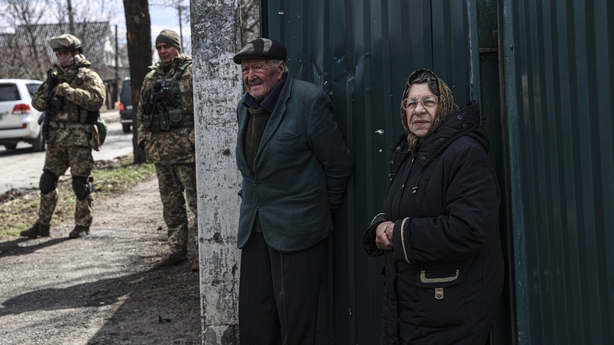A woman from the Ukrainian town of Bucha has said that people fleeing her home city have seen the bodies of children lying on the roadside.
Dozens of corpses, some with their hands bound, were discovered in the town northwest of Kyiv after Russian forces withdrew late last week.
Oksana Vitsinska, 23, opened up about the scale of the horror being inflicted on the Ukrainian people.
Ms Vitsinska has now made it to the safety of her relative Zoryana Pshyk's home in Newbridge, Co Kildare, but many of her friends and neighbours are still trying to escape.
Speaking on RTÉ's Liveline, Ms Vitsinska described the tragic scenes witnessed by one of her friends: "On the way to evacuation she saw the bodies of civilians, children, on the ground."
She insisted that troops are shelling the humanitarian corridors that were intended to allow civilians to leave safely.
We need your consent to load this rte-player contentWe use rte-player to manage extra content that can set cookies on your device and collect data about your activity. Please review their details and accept them to load the content.Manage Preferences
"Our neighbours' car came under fire during the evacuation. One bullet got stuck in the seat where a child was sitting."
An airport three kilometres from her home was attacked on the first day of the Russian invasion.
From their seventh-floor apartment she could see the airport that was being shelled and could hear "horrible sounds".
"We immediately started packing. This was probably the last chance to get out of there."
"Many of my friends, neighbours with children, stayed in Bucha."
"For two weeks they sat in the basement of buildings, without communication, without water, without food."
"It is very difficult to comprehend that this happened on the street of a very peaceful and beautiful town"
"Volunteers who provided assistance were shot dead by Russians," she claimed.
She said that the images emerging from her home town are extremely distressing.
"It was very difficult for me yesterday when I saw hundreds of scary photos from Bucha."
"Killed, torn people and children. Raped, young children and women. Murdered men, with their hands tied."
"I recognise many places in these photos and it is very difficult to comprehend that this happened on the street of a very peaceful and beautiful town, which has not done anything to Russia or Russian people."

She said that every day she looks online at a local news group from Bucha and reads messages from people who are looking for missing relatives.
"Russia took everything from us. Hundreds of civilians were killed. Millions were forced to flee their homes," she said.
Zoryana Pshyk is Ms Vitsinska's mother's first cousin and has lived in Ireland for 16 years.
Initially, she came to Ireland as an asylum seeker with her husband. He was politically active and pro-democracy.
"It's very difficult to watch, but it's even more difficult not to watch, because you need to know what is going on"
In 2003, they were forced to flee and spent six years in direct provision. Their two children were born during this time.
Ms Pshyk has a Masters degree in Slavic languages. She now works for Maynooth University.
She has described the "collective trauma" that the diaspora are experiencing as they watch events unfold from a distance.
"It's very difficult to watch, but it's even more difficult not to watch, because you need to know what is going on," she said.
Ms Pshyk said that Oksana's mother and ten-year-old brother will arrive in Ireland in the coming days.
The boy has been "very traumatised" by the experience. She hopes that coming to Ireland will bring him "some type of respite, normality and healing''.
"It will be good for us to be together as a family. For us, being here you feel helpless."
"Although we are trying to participate in fundraising and support all Ukrainian people who are coming to the country, but it would be really good to give them a hug and feel that they are protected."







